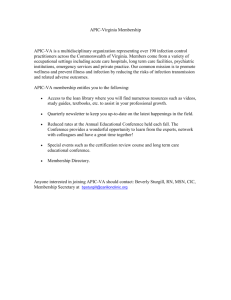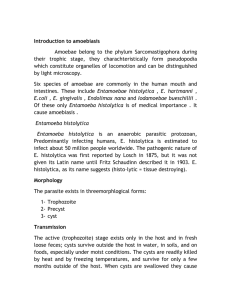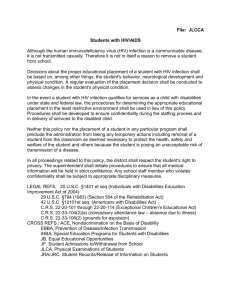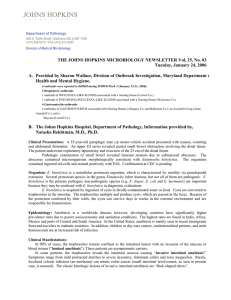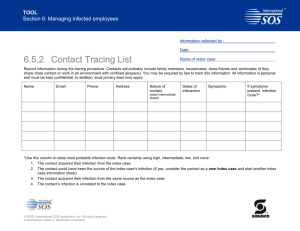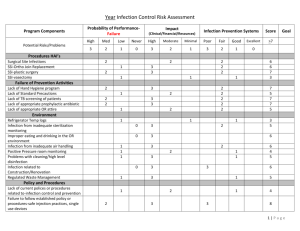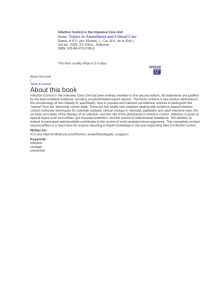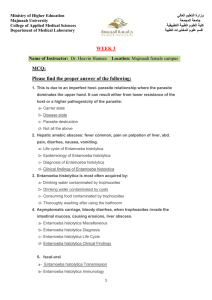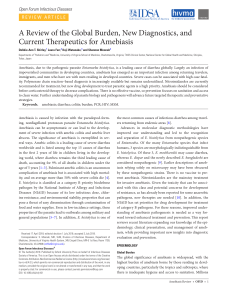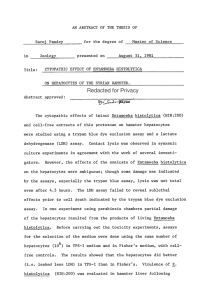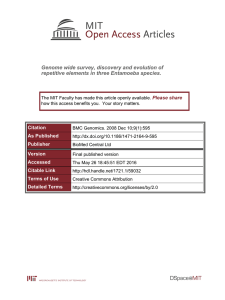this PDF file - Saudi Medical Journal
advertisement
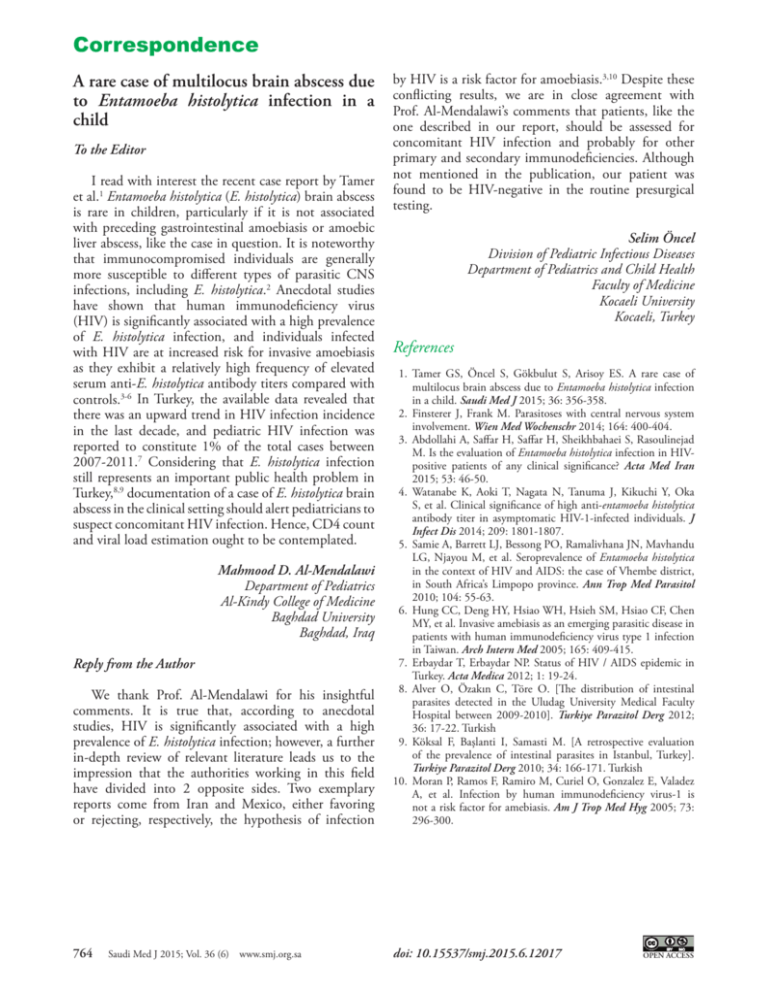
Correspondence A rare case of multilocus brain abscess due to Entamoeba histolytica infection in a child To the Editor I read with interest the recent case report by Tamer et al.1 Entamoeba histolytica (E. histolytica) brain abscess is rare in children, particularly if it is not associated with preceding gastrointestinal amoebiasis or amoebic liver abscess, like the case in question. It is noteworthy that immunocompromised individuals are generally more susceptible to different types of parasitic CNS infections, including E. histolytica.2 Anecdotal studies have shown that human immunodeficiency virus (HIV) is significantly associated with a high prevalence of E. histolytica infection, and individuals infected with HIV are at increased risk for invasive amoebiasis as they exhibit a relatively high frequency of elevated serum anti-E. histolytica antibody titers compared with controls.3-6 In Turkey, the available data revealed that there was an upward trend in HIV infection incidence in the last decade, and pediatric HIV infection was reported to constitute 1% of the total cases between 2007-2011.7 Considering that E. histolytica infection still represents an important public health problem in Turkey,8,9 documentation of a case of E. histolytica brain abscess in the clinical setting should alert pediatricians to suspect concomitant HIV infection. Hence, CD4 count and viral load estimation ought to be contemplated. by HIV is a risk factor for amoebiasis.3,10 Despite these conflicting results, we are in close agreement with Prof. Al-Mendalawi’s comments that patients, like the one described in our report, should be assessed for concomitant HIV infection and probably for other primary and secondary immunodeficiencies. Although not mentioned in the publication, our patient was found to be HIV-negative in the routine presurgical testing. Selim Öncel Division of Pediatric Infectious Diseases Department of Pediatrics and Child Health Faculty of Medicine Kocaeli University Kocaeli, Turkey References We thank Prof. Al-Mendalawi for his insightful comments. It is true that, according to anecdotal studies, HIV is significantly associated with a high prevalence of E. histolytica infection; however, a further in-depth review of relevant literature leads us to the impression that the authorities working in this field have divided into 2 opposite sides. Two exemplary reports come from Iran and Mexico, either favoring or rejecting, respectively, the hypothesis of infection 1. Tamer GS, Öncel S, Gökbulut S, Arisoy ES. A rare case of multilocus brain abscess due to Entamoeba histolytica infection in a child. Saudi Med J 2015; 36: 356-358. 2. Finsterer J, Frank M. Parasitoses with central nervous system involvement. Wien Med Wochenschr 2014; 164: 400-404. 3. Abdollahi A, Saffar H, Saffar H, Sheikhbahaei S, Rasoulinejad M. Is the evaluation of Entamoeba histolytica infection in HIVpositive patients of any clinical significance? Acta Med Iran 2015; 53: 46-50. 4. Watanabe K, Aoki T, Nagata N, Tanuma J, Kikuchi Y, Oka S, et al. Clinical significance of high anti-entamoeba histolytica antibody titer in asymptomatic HIV-1-infected individuals. J Infect Dis 2014; 209: 1801-1807. 5. Samie A, Barrett LJ, Bessong PO, Ramalivhana JN, Mavhandu LG, Njayou M, et al. Seroprevalence of Entamoeba histolytica in the context of HIV and AIDS: the case of Vhembe district, in South Africa’s Limpopo province. Ann Trop Med Parasitol 2010; 104: 55-63. 6. Hung CC, Deng HY, Hsiao WH, Hsieh SM, Hsiao CF, Chen MY, et al. Invasive amebiasis as an emerging parasitic disease in patients with human immunodeficiency virus type 1 infection in Taiwan. Arch Intern Med 2005; 165: 409-415. 7. Erbaydar T, Erbaydar NP. Status of HIV / AIDS epidemic in Turkey. Acta Medica 2012; 1: 19-24. 8. Alver O, Özakın C, Töre O. [The distribution of intestinal parasites detected in the Uludag University Medical Faculty Hospital between 2009-2010]. Turkiye Parazitol Derg 2012; 36: 17-22. Turkish 9. Köksal F, Başlanti I, Samasti M. [A retrospective evaluation of the prevalence of intestinal parasites in Istanbul, Turkey]. Turkiye Parazitol Derg 2010; 34: 166-171. Turkish 10. Moran P, Ramos F, Ramiro M, Curiel O, Gonzalez E, Valadez A, et al. Infection by human immunodeficiency virus-1 is not a risk factor for amebiasis. Am J Trop Med Hyg 2005; 73: 296-300. 764 doi: 10.15537/smj.2015.6.12017 Mahmood D. Al-Mendalawi Department of Pediatrics Al-Kindy College of Medicine Baghdad University Baghdad, Iraq Reply from the Author Saudi Med J 2015; Vol. 36 (6) www.smj.org.sa OPEN ACCESS
